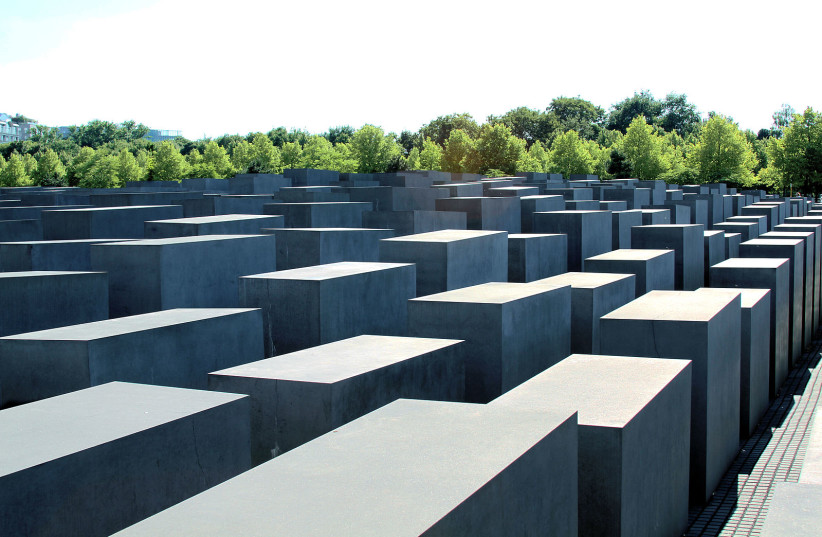The last time the Holocaust memorial dedicated in his parents' names was vandalized, Dennis Judd oversaw the repair work.
It was June 2020 and vandals had knocked over the fountain — a ceremonial piece Jews use for ritual washing and cleansing — breaking the top into pieces and displacing the bowl from its base.
That time, with input from the community, Judd had the brokenness fixed with a blue-tinted sealant.
When the repairs were unveiled in a small, but powerful ceremony with religious leaders of all callings, thin fingers of blue stretched across the top of the fountain, visible from all sides.
The idea was to show the damage, but highlight the healing.

Today, Judd, who lives in Sebastopol, is, inexplicably, again pondering colors. Again pondering repair. Again pondering healing.
Last week, the fountain at Santa Rosa Memorial Park was desecrated again. Again it was pushed over. Again it was broken. This time, more damage was done than 18 months ago.
Judd wonders aloud if the fountain, damaged to a greater extent this time, can be repaired. He has already made inquiries. He will try.
Despite it all, despite being in this position again, Judd does not doubt that whatever hate inspired the vandalism can be healed.
And he wants to be a part of it.
"The people that have the hatred, the people that do this vandalism, in my mind is small, small, small minority and as long as the majority can stick together and focus on the good and the common ground between us, that is what is going to make a difference," he said.
He pointed to the numbers of people who have reached out to him since Friday, offering support, offering help, offering a way forward.
He has started a fundraising campaign. It's gaining traction.
Proof: During our conversation his phone pings constantly. Constantly.
"I'm looking at all the response that has happened in the last few days. It's almost turning it into a magnet of healing," he said.
The fountain is a central piece of a memorial created for Judd's parents, Lillian and Emil, both survivors of the Nazi concentration camp at Auschwitz.
The names of 12 family members are memorialized on a mosaic near the damaged fountain.
Lillian Judd was 21 when she and her family were shipped to Auschwitz. Her mother, father, and two of her sisters were murdered there. More than 1.1 million people were murdered at Auschwitz.
Lillian and Emil did not speak much of their lived experiences until they were much older, Dennis Judd said.
"My parents didn't really talk about the Holocaust in general when I was growing up," he said. "We knew that our grandparents were gone, had been killed by the Nazis, the Germans, and so many aunts and uncle were killed, but that was the extent of it."
Judd remembers his father having extreme nightmares.
His mother did, too. And one changed her life.
"It was seeing her father get murdered right in front of her eyes again," he said. "She realized she had to do something because it was tearing her apart."
"She was not the happiest person when I was growing up, but as she started to write her story on her manual typewriter, the pages just flew off," he said. "That was when I learned the details."
Telling her story gave Lillian Judd a sense of peace, of ease, she had never before felt, Dennis Judd said.
She spent the last decades of her life speaking to students, to business groups, to educators, about the Holocaust, about her life, about hate and about forgiveness.
She spoke about the kind of thing that makes someone want to destroy a traditional Jewish fountain in a cemetery and about the kind of hope that inspires a community to rally and fix it.
She died in 2016 at the age of 92.
Dennis Judd thinks about that, about his mom and her unwavering message of peace and tolerance and standing up for good and right, when he thinks about the fountain that is again broken into pieces by hate.
"There is a lot of hope and examples that she set that has touched a lot of people and I'm trying to keep that going and keep that alive," he said.
He said the response to the crime has buoyed him.
The wider community response has been "overwhelming with love and care. That is what I want to keep supporting."
He thinks back to the last time the community rallied to repair the fountain and to lend support when it was unveiled. It was a moment that came to be because of hate, but ended in unity, in love.
"So many different religious leaders came forward, it has become a place of unity," he said. "That is the big message, thanks to my mother, that is what she would have loved to have seen.
"And I think she's seeing it now."
